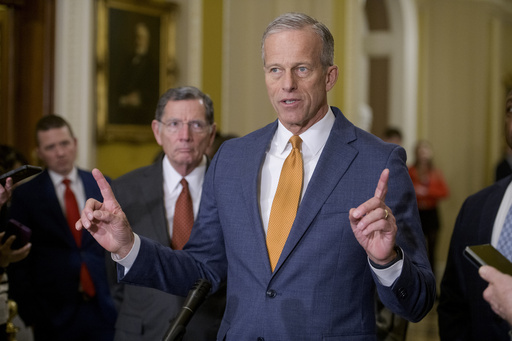
WASHINGTON — Late Tuesday, Senate Republicans advanced a streamlined budget measure valued at $340 billion aimed at providing funds for mass deportations and other administration priorities, as Democrats gear up to respond to the series of actions emanating from the White House.
In a strictly partisan vote of 50-47, Republicans moved forward while bypassing House Republicans, who are in favor of President Donald Trump’s vision for a more expansive bill that features $4.5 trillion in tax cuts — a top item on the party agenda. The Senate Republicans expressed plans to address tax cuts in a separate package later on.
“It’s time to act,” stated Senate Majority Leader John Thune via social media, unveiling the initiative as the House takes a recess week. “Let’s get it done.”
This action marks a significant initial move toward fulfilling Trump’s campaign commitments regarding tax reductions, energy production, and enhanced border security, aiming to set the legislative tone in Congress. Despite holding a majority in both chambers, Republicans encounter substantial challenges in advancing the president’s objectives amidst considerable Democratic opposition.
In conjunction with a government efficiency initiative aimed at reducing costs across various departments, the administration has already resulted in job cuts among federal workers and the dismantling of crucial programs for many Americans. Democrats, having struggled with the early turmoil from the administration, are becoming more organized in their efforts to highlight the stakes involved.
Democratic leader Chuck Schumer organized a private call over the weekend with fellow senators, resulting in a strategic plan to confront Republicans for focusing on tax reductions that mainly benefit the wealthy at the cost of essential services and programs such as U.S. healthcare, scientific research, and veterans services.
As the Senate embarks on the lengthy budget process this week, which will involve an initial 50 hours of debate followed by an anticipated all-night session filled with numerous amendments — known as a vote-a-rama — Democrats are preparing to delve into these critical discussions.
The Republican budget proposal allocates $175 billion for border security measures, including funding for mass deportations and the construction of a barrier along the U.S.-Mexico border. Additionally, it proposes a $150 billion increase in Pentagon funding for defense and $20 billion for the Coast Guard.
Republicans are adamant about moving forward after receiving warnings last week from Trump’s border chief, Tom Homan, and senior advisor, Stephen Miller, that they are facing budget constraints that could hinder the president’s border enforcement initiatives.
The Senate Budget Committee has indicated that the proposed budget will cost roughly $85.5 billion annually over the four years of Trump’s presidency, with funds anticipated to be sourced from new budget cuts and revenue adjustments prepared by other committees.
To finance the proposal, Senate Republicans are contemplating the reversal of the Biden administration’s methane emissions fee, which was established by Democrats in the Inflation Reduction Act as part of their climate initiatives. They are also aiming to generate additional revenue through energy leases to boost domestic production.
Typically, House and Senate budget resolutions serve as declarations of policy goals, but these particular resolutions have the potential to be enacted into law. They are currently being reviewed under the reconciliation process, enabling passage by a simple majority and circumventing many procedural delays that typically hinder legislation. This process has become more common in both chambers to facilitate significant legislative packages when one party holds both the White House and Congress.
During Trump’s prior term, Republicans employed the reconciliation process to pass tax reductions in 2017. Meanwhile, Democrats utilized the same approach during Biden’s presidency to enact COVID relief measures and the Inflation Reduction Act.

